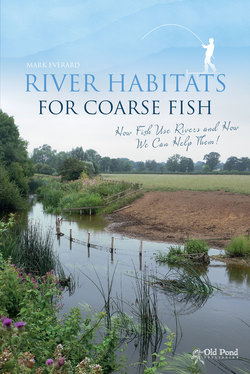River Habitats for Coarse Fish: How Fish Use Rivers and How We Can Help Them

Реклама. ООО «ЛитРес», ИНН: 7719571260.
Оглавление
Dr. Mark Everard. River Habitats for Coarse Fish: How Fish Use Rivers and How We Can Help Them
River Habitats for Coarse Fish
Contents
River Habitats for Coarse Fish: An Introduction
How Coarse Fish Use River Habitats
Life cycles of British freshwater fishes
Fish migration
Spawning habitats
Gravel spawners
Vegetation spawners
Hard substrate spawners
Exceptions to these spawning habitats
Nursery habitats
Refuge habitats
Feeding habitat
Habitat diversity
Bottlenecks and Pressures
Naturalness
Loss of connectivity
Riparian habitat
Channel straightening, dredging and over-management
Taking Action
Influencing the multiple factors affecting fish stocks
Influencing water quality
Influencing water quantity
Influencing invasive species
Managing unbalanced predation
Influencing habitat
Relationships with regulators and other organisations
Taking account of what you have
Practical Fixes
Flexible fixes
Buffer zones
Willow kneeling
Live willow deflectors
Bank stabilisation
Restored spawning gravels
Spawning boards
Opening up bays and backwaters
Tree planting
Bypassing weirs
Spotting wider opportunities
All rivers are different
Why Fish Matter
Epilogue: Rivers with Ragged Edges
Acknowledgements
Appendices
Selected bibliography
Useful contact details
Index
Copyright
Отрывок из книги
How Fish Use Rivers and How We Can Help Them
Mark Everard
.....
This guide focuses primarily on the role of habitat in sustaining the life cycles of fish and supporting river health. From this initial overview, the guide then turns to practical measures that concerned anglers and angling organisations, fishery owners and rivers trusts, conservationists and conservation bodies, and the wider public can do to protect or improve river habitats for coarse fish.
This is because fish matter. You really don’t need to be a keen angler or a fish biologist to appreciate these often overlooked but iconic players in river ecosystems. This is because some fish species have direct conservation value, but is also because all fish species play important roles in the delicate balance of nature. This includes serving as prey for herons, kingfishers, otters and other, perhaps more charismatic (at least in the eyes of many of the general public), species within river ecosystems. Thriving fisheries also speak of healthy water, which is cheaper to treat on its way to our taps and safer to paddle and swim in, and of diverse ecotourism and other benefits to fishers and non-fishers like. So, when fish are absent, we all know instinctively that something is wrong.
.....